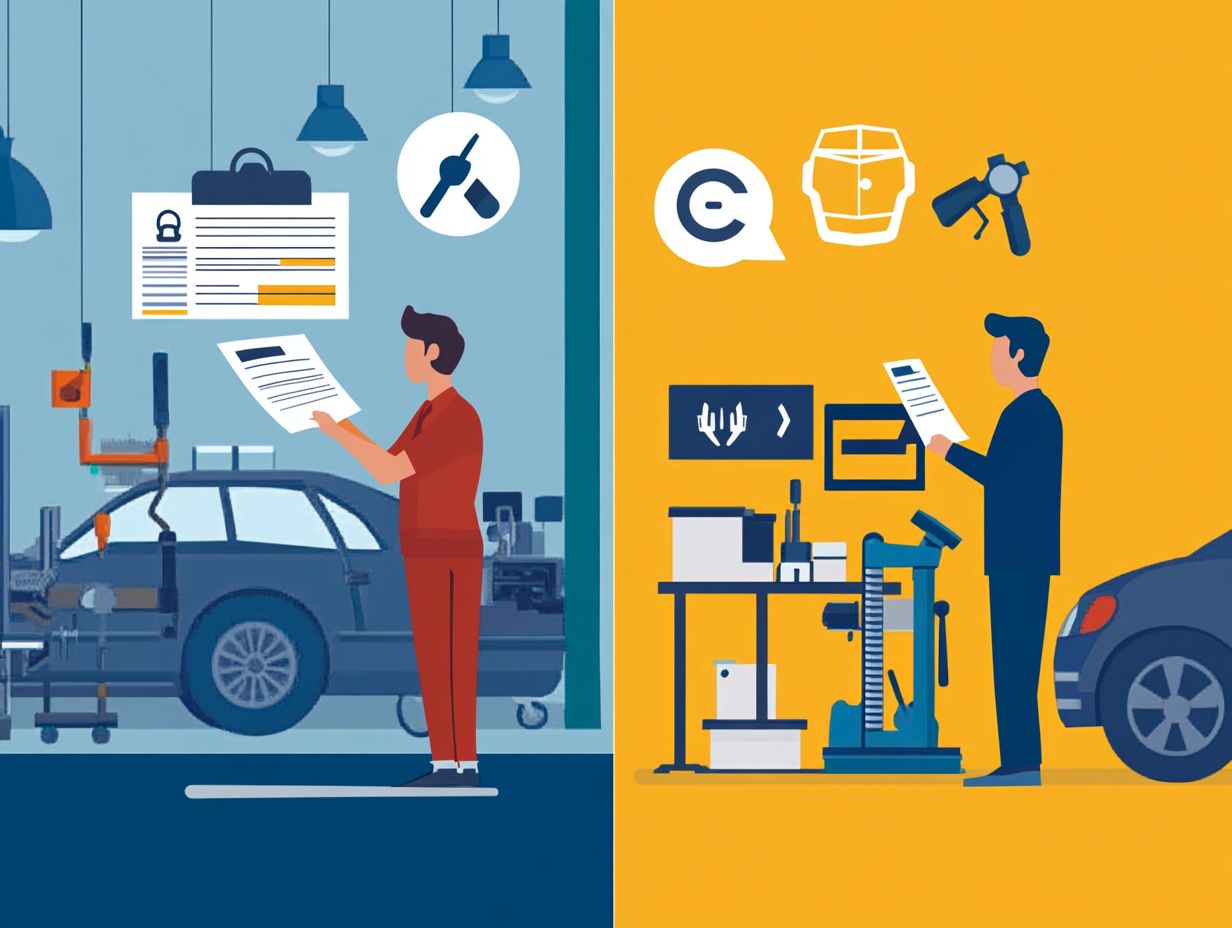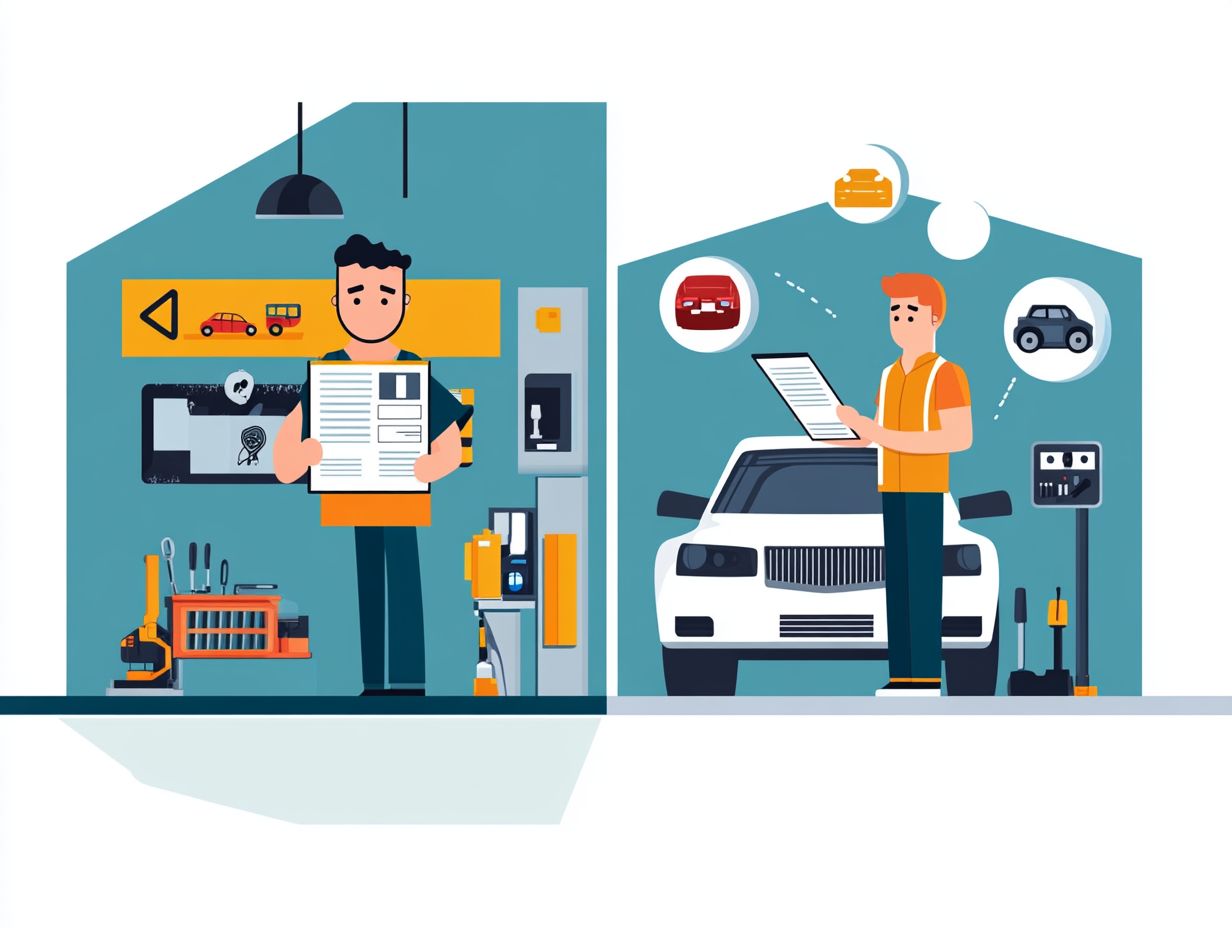5 Common Car Warranty Myths Debunked
Car warranties can indeed be a perplexing subject, often clouded by myths that lead to misunderstandings for vehicle owners like you. As you consider purchasing a new or used car, it s essential to clear up these common misconceptions. From understanding what a warranty genuinely covers to grasping the realities of extended warranties, let s dive into five common myths about car warranties that might surprise you!
You ll discover how they work, the various types available, and gain insights to help you decide if securing a warranty is the right choice for you. Continue reading to empower yourself with the knowledge necessary to make informed decisions about your vehicle s protection.
Contents
- Key Takeaways:
- 1. A Car Warranty Covers All Repairs
- 2. Extended Warranties Are Always a Good Idea
- 3. Only New Cars Come with Warranties
- 4. You Can’t Get a Warranty on a Used Car
- 5. A Warranty Is Not Necessary If You Have Car Insurance
- How Does a Car Warranty Work?
- What Are the Most Common Misconceptions About Car Warranties?
Key Takeaways:

- Don’t miss out! Extended warranties are not always necessary and can be an added expense.
- Used cars can also come with warranties, not just new cars.
- A car warranty is important for protecting against unexpected repair costs.
1. A Car Warranty Covers All Repairs
A car warranty is often seen as a blanket of protection against all automotive repairs. However, grasping the nuances of warranty coverage, including exclusions and limitations, empowers you to make informed decisions about your vehicle’s maintenance and repair needs. For guidance, check out these 5 essential tips for navigating car warranties.
Typically, a car warranty covers major mechanical components such as the engine and transmission, which tend to be the most expensive parts to repair. Understanding what s included can help you avoid unexpected expenses in the future.
It s crucial for you to keep detailed repair records. These documents can be vital when it comes time to file a warranty claim. Many car owners mistakenly think that everything falls under their warranty, leading to frustration when they discover exclusions like routine maintenance which refers to regular services like oil changes and wear-and-tear items.
By sharing real-life experiences, you can illustrate how effective communication with warranty providers can help dispel top myths about car financing.
2. Extended Warranties Are Always a Good Idea
It s easy to think that extended warranties are always a sound investment for vehicle protection. However, it’s crucial for you to evaluate your unique driving habits and the specific warranty options offered by various providers to maintain your financial stability.
If you often find yourself commuting long distances or driving a high-mileage vehicle, extended warranties can offer significant advantages. These warranties not only cover those unexpected repairs but also act as a safety net against the rising repair costs that come with aging cars.
Different warranty providers present tailored plans, with some specifically designed for high-mileage vehicles, catering to your distinct needs. This flexibility allows you to select coverage that aligns perfectly with your situation, whether you prefer powertrain protection which covers major components like the engine and transmission or comprehensive vehicle coverage.
By making the right choice in extended warranties, you can enjoy the peace of mind that comes from knowing you’re protected against common car problems and the financial burdens they entail.
3. Only New Cars Come with Warranties
You may think that warranties are exclusive to new cars, but many used vehicles come with warranty transfer options or even aftermarket warranties that offer similar advantages.
Understanding the distinctions between manufacturer warranties for new cars and the extended warranties available for pre-owned models is essential for you as a potential buyer. While a manufacturer’s warranty typically covers repairs for a set time and mileage, extended warranties for used cars can differ significantly in terms of coverage and duration.
It’s crucial for you to pay close attention to the transferability of these warranties. Some manufacturers allow the existing warranty to be passed on to a new owner, which can enhance the value of your purchase. This detail can profoundly impact your investment in a used vehicle, providing you with peace of mind regarding any unforeseen repairs or issues that may come your way.
4. You Can’t Get a Warranty on a Used Car

Many car owners believe that securing a warranty for a used vehicle is impossible. However, there are several myths about buying used cars that can be debunked, as various warranty providers offer tailored options specifically for pre-owned cars.
Understanding the different types of warranties can ease worries about repair costs. Warranties vary in coverage ranging from basic powertrain protection (the system that powers your vehicle), which covers essential components, to comprehensive plans that include electronics.
When choosing a warranty provider, compare prices and coverage details. It s important to review customer feedback and be aware of limitations like mileage restrictions and claim procedures.
Pick a warranty that matches your driving habits and possible repairs to unlock significant savings over time.
Don t let unexpected repair bills catch you off guard!
5. A Warranty Is Not Necessary If You Have Car Insurance
Some car owners think that car insurance eliminates the need for a warranty. Understanding the differences between them highlights the importance of warranties for covering unexpected repairs, as outlined in 5 essential tips for understanding car warranties.
Car insurance provides financial protection against accidents and theft. In contrast, warranties cover specific mechanical failures and repairs. For instance, if your vehicle s transmission fails, a warranty can help reduce your out-of-pocket costs.
This distinction highlights that while insurance covers external damage, warranties protect against internal malfunctions. A warranty can save you from large deductible payments and surprise bills.
Don t let unforeseen issues surprise you; a warranty is your safety net!
How Does a Car Warranty Work?
Knowing how a car warranty works is crucial for car owners. It involves navigating the claims process and understanding your warranty details and coverage options.
When filing a claim, gather all necessary documentation, such as repair receipts and service records. This will help streamline the process and ensure your claim is handled quickly.
Different warranty types, like bumper-to-bumper (covering most parts of the car, except for wear-and-tear items) or powertrain warranties, offer varying protection levels. Understanding warranty transferability is also important when selling your vehicle, as it can enhance its resale value.
Be proactive in understanding your warranty to avoid future headaches!
What Are the Different Types of Car Warranties?
Car warranties come in different forms, including manufacturer warranties, extended warranties, and service contracts. Each offers unique benefits tailored to your needs.
Understanding these types is vital when facing unexpected repairs. Manufacturer warranties cover defects in materials and workmanship for a set time or mileage, giving peace of mind as your car ages.
Once the manufacturer s coverage ends, extended warranties provide protection against costly repairs. Service contracts offer a tailored approach, covering specific types of repairs.
If you often take long road trips, extended warranties could be beneficial. Meanwhile, city dwellers may prefer service contracts to manage urban wear and tear.
Make an informed choice to protect yourself from future repair costs!
What Are the Most Common Misconceptions About Car Warranties?

Several prevalent warranty myths can mislead you as a car owner. For instance, understanding the 5 common myths about car maintenance can help clarify issues related to warranty limitations, claim denials, and coverage exclusions that can significantly impact your repair costs.
You might believe that all mechanical failures are covered under warranty. This is often a misconception, leading to unexpected expenses when issues arise. A study by the Automotive Warranty Association found that nearly 30% of claim rejections are due to this belief. Understanding the 5 key takeaways about car warranties can help clarify these misconceptions. Many people also assume their warranties can be transferred, which can create confusion when selling the vehicle.
By understanding these leasing myths, you can empower yourself to make informed decisions, potentially saving a lot of money on repair costs and avoiding frustration during the claims process.
How Can One Determine If They Need a Car Warranty?
Determining whether you need a car warranty involves evaluating several factors, such as your driving habits, the age and condition of your vehicle, and the financial security desired for unexpected repair costs.
For example, if you often navigate heavy traffic or tackle off-road terrains, the wear and tear on your vehicle will likely increase. This makes a warranty more appealing. If you own an older car with a history of mechanical issues, having warranty coverage can be valuable.
Each driving pattern and vehicle type presents unique challenges, guiding car owners like you to weigh the benefits of securing a warranty that fits your lifestyle and financial comfort.
What Are the Benefits of Having a Car Warranty?
Having a car warranty offers many benefits, notably the peace of mind from knowing repair bills are taken care of, leading to significant long-term savings.
This financial predictability is advantageous for those who prefer a budget-friendly approach to vehicle ownership. For instance, if your transmission fails unexpectedly, a warranty can cover those hefty repair costs, easing your financial burden.
With such coverage, the stress of repairs diminishes. You can take your vehicle to an authorized service center without worrying about costs. This assurance allows you to enjoy your ride without worrying about surprise repair bills.
Additionally, a car warranty can enhance your vehicle’s resale value. Prospective buyers often see the remaining warranty as a safeguard against future expenses, making your vehicle more attractive in the market.
What Are the Risks of Not Having a Car Warranty?
The risks of forgoing a car warranty can be substantial. You may face unexpected repair costs from mechanical breakdowns that disrupt your financial stability.
Imagine your engine suddenly fails. Without a warranty, you could face a $4,000 repair bill for a replacement, a hit that could derail your monthly budget.
These unforeseen expenses can induce stress, complicating your ability to manage essential payments like your mortgage or rent. The emotional burden is intensified by the logistical headache of arranging alternative transportation while navigating repair timelines.
Facing these challenges without the safety net of a warranty can be overwhelming. This is why many savvy individuals opt to invest in this form of protection.
Frequently Asked Questions

What are common car warranty myths that need to be debunked?
- All warranties cover everything.
- Extended warranties are always a waste of money.
- New cars don t require warranties.
How do I choose the right warranty for my car?
When selecting a warranty, consider factors like your vehicle’s make, model, age, and your driving habits. Don t wait until it s too late! Protect your finances by exploring warranty options today.
Do all warranties cover everything?
No, that’s a common myth. Warranties usually have specific limits and exclusions, so be sure to read the fine print. For a deeper understanding, check out 5 things to know about car warranties before buying.
Are extended warranties a waste of money?
Not always. They can be a great investment for those keeping their car long-term or who frequently face expensive repairs.
Do new cars need warranties?
New cars often include a manufacturer’s warranty. However, that doesn’t mean they won’t have issues, especially when it comes to electric vehicles. It’s important to be aware of common misconceptions, so check out 5 myths about electric cars debunked to stay informed.
You never know when a surprise might hit! That’s why having protection is smart.
Are third-party warranties unreliable?
No way! Many reputable third-party providers offer comprehensive coverage at lower costs than dealership warranties.
Do your research, and read reviews to find a trustworthy option.
Can you buy a warranty for a used car?
Absolutely! In fact, getting a warranty for used cars is often crucial.
They are more likely to face unexpected problems, so don’t wait until it’s too late having a warranty gives you peace of mind!




